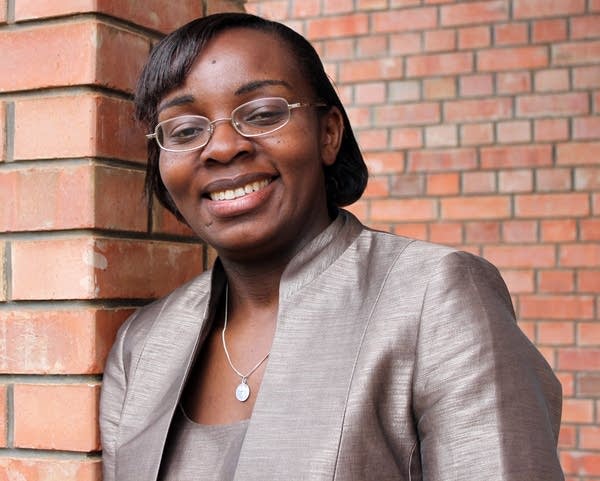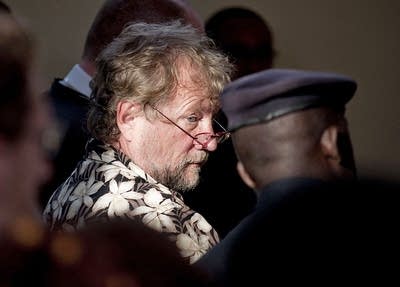Minnesota lawyer caught in Rwandan political fight

A prominent Rwandan opposition leader spoke out Wednesday in defense of her jailed attorney, Minnesota law professor Peter Erlinder, who has been detained in the African country on charges of denying the country's 1994 genocide.
Rwandan presidential candidate Victoire Ingabire accused the current government of using Erlinder as a pawn in a growing crackdown on political opposition.
"We condemn [his arrest] as shameful exploitation of the misfortune of all people for political ends," Ingabire told MPR News.
Erlinder, 62, arrived in Rwanda about two weeks ago to represent Ingabire against charges that she denied the genocide. The William Mitchell College of Law faculty member was arrested on May 28 and faces similar charges of violating the country's laws against "genocide ideology." If convicted, he could face 25 years in prison.
Create a More Connected Minnesota
MPR News is your trusted resource for the news you need. With your support, MPR News brings accessible, courageous journalism and authentic conversation to everyone - free of paywalls and barriers. Your gift makes a difference.
Known for taking on unpopular clients and causes, the law professor has been a pointed critic of Rwandan President Paul Kagame and has been outspoken in his disagreement with the government's official explanation of the 1994 genocide.
Rwanda's genocide killed more than 800,000 people, according to estimates by human rights groups, mostly Tutsis and moderate Hutus. The massacres ended when mostly Tutsi rebels led by Kagame defeated the Hutus.
In April, Erlinder helped file a lawsuit in Oklahoma accusing Kagame of ordering a plane that was carrying the presidents of Rwanda and Burundi to be shot down in 1994. The deaths are widely blamed for sparking the mass killings.

Speaking by phone from Rwanda, Ingabire accused the Kagame government of targeting Erlinder for his outspoken views and using the arrest to derail her presidential campaign.
"The government of Kagame uses the genocide as blackmail to frame everybody who's against him," she said.
Ingabire said she hopes the situation will shine a light on political oppression in Rwanda -- and she called on the U.S. government to do more to support democracy throughout Africa.
Rwanda's foreign minister has denied allegations that Erlinder's arrest was related to the August presidential election, and has said that Westerners do not understand the significance of the genocide denial charges.
"What they fail to understand is this is Rwanda, and Rwanda is a country where genocide was committed, and for the past 16 years people have been guarding very preciously the social cohesion and the whole aspect of reconciling as a nation," said foreign minister Louise Mushikiwabo. "It's extremely serious in this country."
Erlinder's supporters say his legal situation remains uncertain. The U.S. State Department and key lawmakers have called for his release, but supporters have accused the State Department of not doing enough on his behalf.
Two members of Minnesota's Congressional delegation, Rep. Betty McCollum and Rep. Keith Ellison, introduced a resolution this week calling on the Rwandan government to free Erlinder.
McCollum said the Rwandan embassy in Washington D.C. has not responded to repeated inquires from her office, including her personal visit to the embassy last Friday. She said the Rwandan government risks jeopardizing a bilateral relationship that has produced more than $1 billion in U.S. aid for the African country.
"It's not damaged yet," she said. "But this is a concern I have when phone calls aren't returned, and when people definitely have health problems, and the Rwandan government has in its ability to expedite situations. We're calling on them to do that."
Senator Amy Klobuchar has also requested an expedited appeal for Erlinder.
On Friday, a Rwandan judge rejected Erlinder's request for bail, over the objections of his attorneys who argued that Erlinder should be released for medical reasons. His family has said that Erlinder suffers from a heart condition, high blood pressure, and depression.
Ingabire, who has not been allowed to visit Erlinder, also expressed concern about his health.
"The conditions in prison in Rwanda are not good," she said. "There are no mattresses. You have to bring a mattress. There's no window. There's no door. It's not really somewhere you can put someone with health problems like Peter."
Erlinder has been hospitalized twice since his arrest, amid Rwandan allegations that he has faked illness to get out of jail. Rwandan officials have said they will monitor his health closely while he awaits trial.
(MPR's Laura Yuen, Sam Choo and Tom Crann contributed to this report.)
